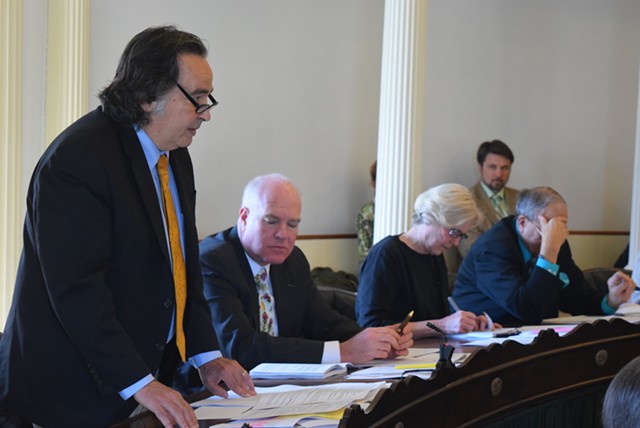
- Terri Hallenbeck
- Sen. Anthony Pollina makes the case for an ethics reform bill for government officials.
Senators poked at details of an ethics reform bill Tuesday, with one calling it a “pretty big pile of mud,” but when it came time to vote, every lawmaker in the chamber voted to give preliminary approval to the measure.
“Given the fact that we’re one of the few states with no ethics regulation, this is a first step to get us where we need to go,” said Sen. Anthony Pollina (P/D-Washington), lead spokesman for the bill on behalf of the Senate Government Operations Committee.
Perhaps speaking more to the public than to his colleagues at the Statehouse, Pollina twice asserted, “Nobody should think by this proposal that we believe there is widespread corruption in state government.”
The bill disappointed Paul Burns, executive director of the Vermont Public Interest Research Group, because it fails to include a ban on candidates accepting contributions from anyone who has bid or plans to bid on a state contract. He argued that Gov Ops flip-flopped on the ban. Tuesday, the committee proposed that the ethics commission, which the bill sets up, should study the need for such a prohibition.
“The simple answer should be ‘no,’” Burns said of contributions from state contractors. “Frankly, they punted.”
The bill establishes a five-member ethics commission that would accept, review, refer and track alleged violations of a state ethics code yet to be written. Pollina stressed that the commission’s primary work would be educational and advisory, not regulatory: “The ethics commission we are establishing has no real enforcement power.”
The bill would, however, clamp down on a practice that 33 states have already restricted — the so-called “revolving door” between government and advocacy. The bill would make legislators and top government officials wait at least one year before going to work for private clients to advocate before the legislature or other public bodies.
The measure would also mandate that candidates for the legislature and statewide offices disclose sources of income greater than $10,000, income from employment, investments and leases or contracts with the state, as well as list boards on which they serve and companies in which they hold controlling interests. State officials, including agency secretaries, commissioners and their deputies, would be required to file similar disclosure forms.
“We aren’t blazing any new territory” with the disclosure requirement, Sen. Joe Benning (R-Caledonia) said. “We are behind the times,” he said, noting that 27 states already have disclosure requirements.
Sen. Jane Kitchel (D-Caledonia) wondered whether a landlord would list rent as an income source if the landlord lost money.
Benning replied that the executive director of the commission could offer advisory opinions.
“So if we have a lack of clarity, we are going to rely on a part-time exempt employee to interpret the law?” Kitchel asked.
“I don’t think we have a lack of clarity,” Benning said.
Sen. Bobby Starr (D-Essex/Orleans) struggled to understand the potential effect of the ban on campaign contributions from potential state contractors, which led him to blurt, “I just think it is a pretty big pile of mud.”
But when the senate secretary called the roll, every senator voting ahead of him had said ‘yes,’ so he joined the chorus.
Senators also approved two rules that establish ethics complaint procedures and disclosure requirements for themselves — but not before some back and forth about the independence of the legislative ethics panel being set up to review complaints about senators.
Sen. Claire Ayer (D-Addison) wanted the new ethics panel to write its own procedures. “I think the autonomy of the ethics panel is important.”
Senate Majority Leader Phil Baruth (D-Chittenden) argued that the Senate Rules Committee should have the final say about the procedures. In fact, the current rules committee has already written a set of procedures. Baruth argued, “I think we need something in place now” — before an ethics panel is named next January.
“We have kicked the can for 14 years,” Ayer countered. “A few months aren’t going to make a difference.”
Baruth was willing for the new ethics panel to review and revise the procedures next winter, “but I don’t think another committee (other than the rules committee) should be putting out rules.”
Ayer countered that the rules committee could simply ignore proposals from the ethics panel.
With compromise elusive, Senate President Pro Tempore John Campbell (D-Windsor) postponed action on the rule by the full Senate and reconvened the rules committee later in the day to resume the debate. When the rules committee reconvened, all sides had agreed on a compromise that allowed the ethics panel to offer revisions to the procedures developed by the rules committee and required the rules committee to consider those revisions and report on them to the full Senate.
The Senate will vote again on the ethics reform bill Wednesday. Then the bill goes to the House, where its fate so late in the session is uncertain.
“We will look at it,” said Rep. Donna Sweaney (D-Windsor), but the chair of the House Government Operations Committee noted that her committee’s schedule this week was already full. “It would be important to do something,” she said. “We will see what we can do.”











Comments
Comments are closed.
From 2014-2020, Seven Days allowed readers to comment on all stories posted on our website. While we've appreciated the suggestions and insights, right now Seven Days is prioritizing our core mission — producing high-quality, responsible local journalism — over moderating online debates between readers.
To criticize, correct or praise our reporting, please send us a letter to the editor or send us a tip. We’ll check it out and report the results.
Online comments may return when we have better tech tools for managing them. Thanks for reading.